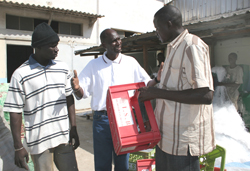You are here » Home » Telling Our Story
Success Story
Industries and individuals learn to profit from recycling
Junked Plastics Make Profits

| |
Photo: USAID/Richard Nyberg
|
|
Pape Amadou Sow, center, discusses discarded plastic sources with collectors Cheikh Jone, left, and Mbacké Dieng at his recycling plant in central Dakar.
“This is exactly the kind of assistance that is needed in developing countries,” said Pape Amadou Sow, an entrepreneur and plastics recycler.
|
Pape Amadou Sow is one of Senegal’s leading plastics experts. Sow is serious about plastic. Having worked with it his entire life, he knows its potential and value, both new and recycled. He is the man responsible for introducing the small black plastic shopping bag for fruits and vegetables into the local market. Unfortunately, countless bags have found their way onto streets and across fields, dotting and polluting the landscape. Now he wants to catch all those discarded bags — and just about every other kind of plastic waste he can get his hands on — and recycle it. With USAID support, he’s well on his way.
In the past, Senegal’s recycling market was limited almost exclusively to grinding up old plastic sandals, commonly worn in Africa. The shoes are manufactured in Senegal, so plastic is always in demand. But USAID-funded research showed vast potential for recycling industrial plastic waste and quality plastic waste from landfills. USAID saw an opportunity to capitalize on this and in 2004 began working with Sow’s company, Recyplast.
Armed with research and technical advice, Sow began working with collectors at a central landfill to bring in discarded bottles, crates, bags, bowls, and tubs to be cleaned, ground up, and resold as flakes or powder. He and his eight employees rent trucks to collect several tons of plastic at a time. And the plastic keeps coming, thanks to collectors who supplement their incomes by hunting part-time for quality used plastic.
With soaring oil prices, recycled plastics are becoming more valuable. Sow is exploring export options — in fact, with his partners he has already exported an entire container of plastic.
Sow acknowledges USAID’s critical role in the project. “This is exactly the kind of assistance that is needed in developing countries,” he said. “We had an idea that we thought could work and bring in revenue.” He noted that USAID and its partners provided “the market overview and technical guidelines to carry out this activity and remained at our side to help us along.”
To date, more than 70 tons of plastic have been recycled with USAID’s help.
Print-friendly version of this page (434kb - PDF)
Click here for high-res photo
Back to Top ^ | 

